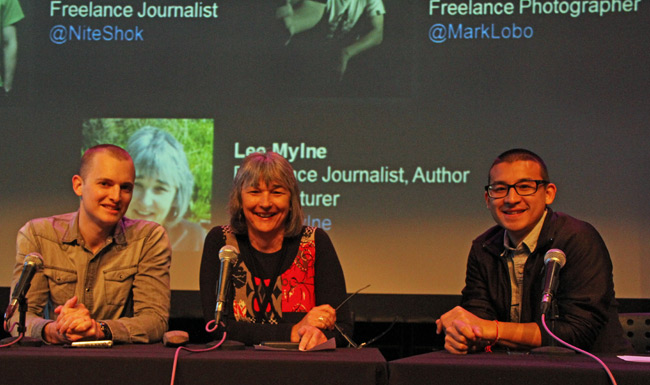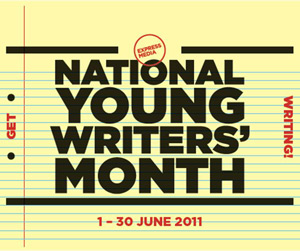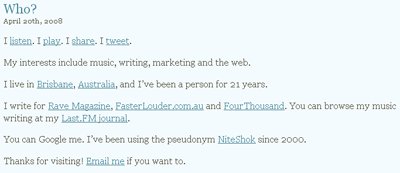Freelance journalism presentation at Walkley MediaPass student industry day, August 2012
I was invited by the Walkley Foundation to speak at the Brisbane leg of their annual MediaPass student industry days, which are held at capital cities across Australia. The brief was thus:
Surviving and Thriving as a Freelancer
Find out how to pitch a story, network and negotiate contracts. Featuring:
[from left to right, below]

Before an audience of around 40 final-year journalism students at the Brisbane Powerhouse, we each gave a five minute presentation and then fielded questions from the audience for the remaining half-hour. I spoke on the topic of ‘twelve points for all beginner freelancers to keep in mind’.
My presentation is embedded below. Click here to watch on YouTube. (Apologies for the footage being off-centre.) I’ve also included the text of my talk underneath.
Twelve points for all beginner freelancers to keep in mind
1. Freelancing, at its heart, is really just hustling. It’s learning how to support yourself through persistence, energy and ingenuity. That’s all. Learn how to hustle and you’re set. The only problem is that it takes years to learn how to hustle consistently.
2.When you start freelancing, the learning curve is steep. You’re fighting against the world; fighting to be heard, fighting to get your name recognised, fighting to get paid. You probably won’t make enough money to pay your rent in the first year, which is why you should do other work on the side until you’re ready to freelance full-time.
3. But eventually – perhaps years later – it becomes less of a fight. You learn to glide through the world rather than struggling against it. You see things differently, with wiser eyes. You can dip in and out of conversations, projects, and work relationships with much less friction, because there’s much less to lose. You have less to prove, because you’ve already proven yourself to some extent.
4. There’s a lot to be said for starting slow, though, and at the bottom. For example, I wrote for street press, essentially without being paid, for nearly two years before I decided that writing and journalism was what I really wanted to do. From there, it was a slow process of me working out how to get paid for what I really wanted to do.
5. Find your gap in the market, but be patient. After doing freelance journalism for a few years, I eventually realised that my gap is to read between the lines and write about what others aren’t. That’s when I’m happiest. That’s not to say that all of my writing consists of that kind of work. I’d say less than half of my income comes from writing those kinds of investigative feature stories. It’s worth pointing out that I only had this realisation in the last 12 months, too.
6. I definitely didn’t know my gap in the market when I started freelancing. In fact I had very little idea of what I was doing when I started freelancing. I just did it. I followed my interests, and my instincts, and kept knocking on doors. Some opened, some remained closed. When I started freelancing, music journalism was the only kind I did. Gradually, other interests took hold, and now music is one of many topics that I write about. I’d likely never have found these other interests, or that I could write about them, unless I’d started with music, though. So don’t be afraid to specialise early. You never know where your career will lead if you just keep at it.
7. Hunger can’t be learned, only encouraged. You, and you alone, must be hungry enough to want to succeed. This is an inbuilt character trait, I believe – you can’t be taught to be hungry. You’ve got to be serious, and dedicate yourself to your work, if you want to succeed at freelancing.
8. Your professional reputation is everything. Guard it with your life. Act with integrity at all times. Don’t do things in private that you wouldn’t be comfortable with, if it became public.
9. Make a list of the best practitioners in your field; your favourites. Consume their work over and over. Work out why you like them and what they do that appeals to you. Then think about how you can put an original spin on their approach, or their approaches. It’ll take you a while to find your style and voice in any creative medium – writing, photography, comedy, illustrations. Don’t rush it. I’m not even sure if you can rush it, anyway. It’s a process that can’t be short-cut.
10. Surround yourself with allies. Not necessarily other freelancers. Not necessarily people working in the same field as you. But you should start building up a support network, and regularly keep in touch with as many of those people as you can, because some of your best work will arise from one-off meetings or incidental friendships. Allies are important because freelancing is generally a solitary activity. Everyone needs to communicate with others at some stage. Best to start early.
11. Be wary of anyone who glamourises the so-called “freelance lifestyle”. Most of freelancing is incredibly mundane. Seriously. Most of my days are spent alone at the computer. Some weeks I don’t even leave the house during my workdays. But there are definitely occasional glimmers of awesomeness that remind you why you’re doing this, and why you love it. Don’t get me wrong, freelancing is great, but to a certain extent it’s a job just like any other. There will be days when you won’t want to do any work. However, if you can push yourself to work even on those shitty days, you’ll eventually be a great freelancer.
12. Don’t talk so much online. Just do good work, make meaningful connections, and be pleasant to everyone you meet behind the scenes. Try not to buy too much into meaningless talk-fests on Twitter and Facebook. Ultimately, you are the only person standing between success and failure. While you’re tweeting away your workdays, your freelance competition is quietly beating you. Don’t give them the chance.
Elsewhere: I participated in the freelance panel at the Walkley Foundation’s last MediaPass student day in September 2011, too. Footage and text here.
 Why I Write: Andrew McMillen
Why I Write: Andrew McMillen This is the reason why my current bio [pictured right] makes me look like an asshole, although when I wrote it last year, I thought I was being clever.
This is the reason why my current bio [pictured right] makes me look like an asshole, although when I wrote it last year, I thought I was being clever.